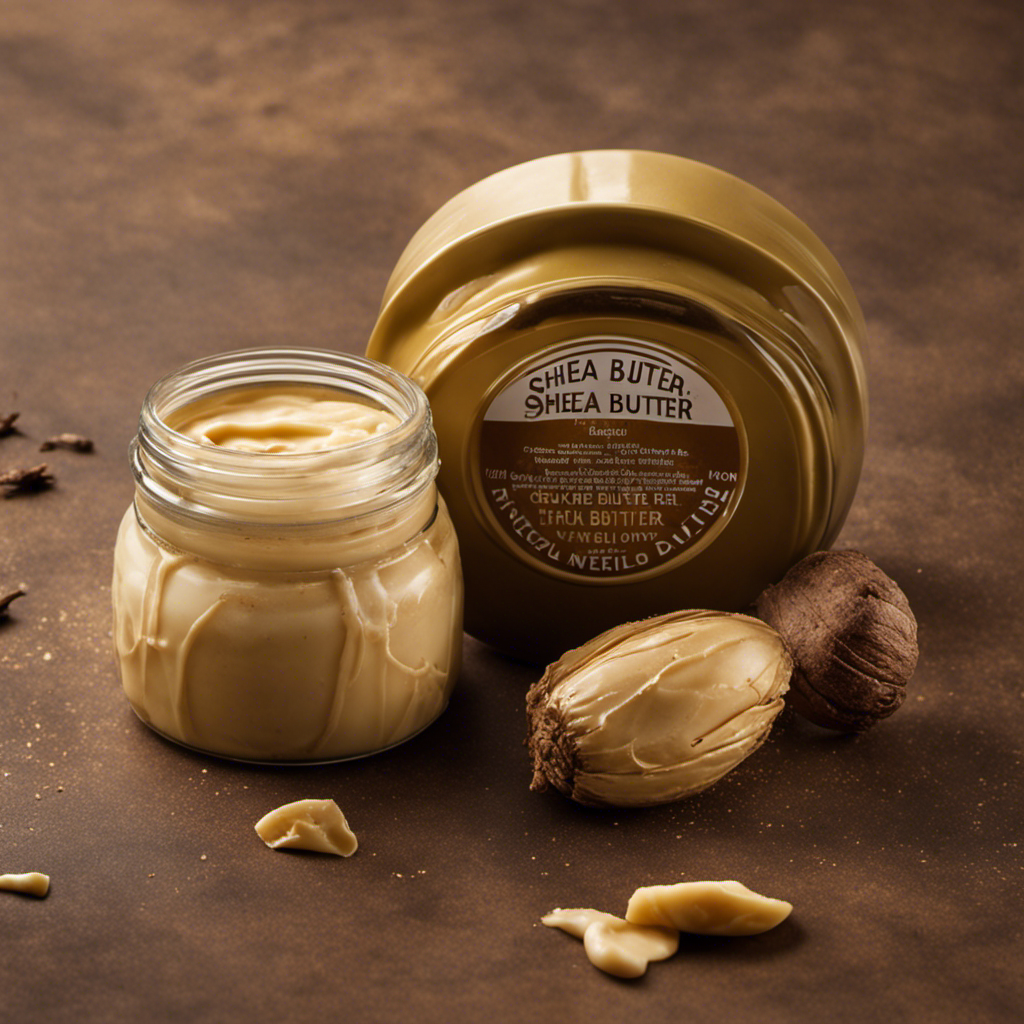Butter and Cholesterol: Debunking Myths
As a health enthusiast, I’ve always wondered about the connection between butter and cholesterol. It’s a topic that often sparks debates and leaves people confused.
But fear not, because in this article, we will debunk the myths surrounding butter and cholesterol. We’ll explore the relationship between these two, understand cholesterol levels, and address common misconceptions.
So grab a stick of butter and join me on this evidence-based journey to uncover the truth about butter and its role in a healthy diet.
Key Takeaways
- Scientific studies have found that butter consumption is associated with increased levels of LDL cholesterol.
- The American Heart Association recommends limiting saturated fat intake, including butter, to reduce the risk of high cholesterol and heart disease.
- Vegetable oils are suggested as healthier alternatives to butter due to their lower saturated fat content.
- Consuming butter may have a negative impact on cholesterol levels.
The Relationship Between Butter and Cholesterol
If you’re worried about your cholesterol levels, you might be wondering if eating butter will have a negative impact on them. Scientific studies have been conducted to examine the relationship between butter and cholesterol, and their findings can help us understand the impact of butter consumption on our cholesterol levels.
Several scientific studies have investigated the effects of butter on cholesterol levels. One study published in the New England Journal of Medicine found that butter consumption was associated with increased levels of LDL cholesterol, also known as ‘bad’ cholesterol. Another study published in the American Journal of Clinical Nutrition found that butter intake was positively correlated with total cholesterol levels. These studies suggest that consuming butter may indeed have a negative impact on cholesterol levels.
However, it’s important to consider dietary recommendations when it comes to butter and cholesterol. The American Heart Association recommends limiting the intake of saturated fats, including butter, to reduce the risk of high cholesterol and heart disease. They suggest opting for healthier alternatives, such as vegetable oils, which are lower in saturated fats.
Understanding Cholesterol Levels
Understanding cholesterol levels can be crucial in maintaining good heart health. Cholesterol is a waxy substance found in the blood and is produced by the liver. It is essential for the production of hormones, vitamin D, and bile acids, which help in the digestion of fats. However, high levels of cholesterol can lead to the buildup of plaque in the arteries, increasing the risk of heart disease and stroke.
Cholesterol management plays a vital role in preventing heart disease. Regular cholesterol testing is recommended to assess the levels of LDL (low-density lipoprotein) cholesterol, HDL (high-density lipoprotein) cholesterol, and triglycerides. LDL cholesterol is often referred to as ‘bad’ cholesterol as it can contribute to plaque buildup in the arteries. HDL cholesterol, on the other hand, is known as ‘good’ cholesterol as it helps remove excess cholesterol from the blood. Triglycerides are a type of fat stored in the body and high levels can also increase the risk of heart disease.
Cholesterol testing involves a simple blood test that measures the levels of these lipids in the blood. The results help healthcare professionals determine a person’s risk for heart disease and guide treatment decisions. Lifestyle modifications, such as adopting a heart-healthy diet, regular exercise, and weight management, are often recommended for cholesterol management. In some cases, medication may be prescribed to help lower cholesterol levels.
Understanding cholesterol levels and actively managing them through regular testing and lifestyle modifications can significantly reduce the risk of heart disease. It is important to work closely with healthcare professionals to develop an individualized cholesterol management plan that suits your specific needs and lowers your risk of heart disease.
Common Misconceptions About Butter
To clear up any confusion, let’s talk about some common misconceptions you might have about using butter in your diet. There are many myths surrounding butter and its impact on our health. However, it’s important to separate fact from fiction and understand the true health benefits of incorporating butter into our diet.
| Misconception | Fact | Emotional Response |
|---|---|---|
| Butter is unhealthy and should be avoided. | Butter is a natural source of healthy fats, vitamins, and minerals. Moderation is key. | Reassurance, relief |
| Butter increases cholesterol levels. | While butter does contain cholesterol, research shows that dietary cholesterol has little impact on blood cholesterol levels. | Surprise, curiosity |
| Margarine is a healthier alternative to butter. | Margarine is often highly processed and contains trans fats, which have been linked to heart disease. Butter, when consumed in moderation, can be a healthier choice. | Disbelief, realization |
| Butter is fattening and contributes to weight gain. | Healthy fats in butter can actually promote satiety and help control appetite. It’s the overall balance of calories that affects weight gain, not just one food. | Hope, motivation |
It’s important to note that while butter does have health benefits, moderation is key. As with any food, excessive consumption can lead to weight gain and other health issues. But when incorporated into a balanced diet, butter can provide essential nutrients and add flavor to our meals. So, don’t be afraid to enjoy a pat of butter on your toast or to cook with it occasionally. Just remember to practice moderation and make informed choices about your overall diet.
The Role of Butter in a Healthy Diet
When it comes to heart health, there has been a long-standing debate about the role of butter in our diets. Many people believe that butter is bad for the heart due to its high saturated fat content. However, recent research suggests that the relationship between butter and heart health is more complex than previously thought.
In this discussion, we will explore the impact of butter on heart health, as well as alternative options and their potential benefits.
Butter and Heart Health
Butter may not be as harmful to your heart health as you think. Contrary to popular belief, recent research suggests that butter may not be as detrimental to inflammation and blood pressure as once thought.
While it is true that butter contains saturated fats, which have been linked to increased inflammation and higher blood pressure, it is important to consider the overall context of one’s diet and lifestyle. Moderation is key when consuming butter, as part of a balanced diet.
It is also important to note that not all saturated fats are created equal, and the impact on heart health can vary depending on the source.
In the next section, we will explore some alternatives to butter and their potential benefits for heart health.
Butter Alternatives and Benefits
Now that we have discussed the impact of butter on heart health, let’s explore some butter alternatives and their benefits.
Many people are looking for alternatives to butter due to health concerns or dietary restrictions. One popular option is margarine, which is made from vegetable oils. Margarine is typically lower in saturated fat compared to butter, making it a heart-healthy choice.
Another alternative is coconut oil, which contains medium-chain triglycerides that can boost metabolism and provide quick energy.
Additionally, ghee, a type of clarified butter, is often used in cooking and has a rich, nutty flavor.
Furthermore, grass-fed butter is gaining popularity due to its potential health benefits. It is higher in beneficial omega-3 fatty acids and conjugated linoleic acid (CLA), which may have anti-inflammatory properties.
Now, let’s dive into the next section and debunk the myth that butter causes high cholesterol.
Debunking the Myth: Butter Causes High Cholesterol
You might be surprised to learn that butter does not actually cause high cholesterol. Despite the common belief that butter is a major contributor to high cholesterol levels, scientific research has debunked this myth. In fact, butter can be a part of a healthy diet when consumed in moderation.
Let’s take a closer look at the relationship between butter and weight gain, as well as butter and brain health.
When it comes to weight gain, it is important to consider the overall calorie intake and balance of macronutrients in one’s diet. While butter is high in calories and saturated fats, it can be enjoyed as part of a well-rounded meal plan. It’s all about moderation and portion control. Incorporating butter into a diet that is rich in fruits, vegetables, lean proteins, and whole grains can help maintain a healthy weight.
Additionally, butter has been linked to brain health benefits. It contains important nutrients like vitamin D, which plays a crucial role in brain development and function. Research suggests that vitamin D deficiency may be associated with an increased risk of developing cognitive impairments. Including butter in your diet can help ensure an adequate intake of this essential nutrient.
To summarize, butter does not directly cause high cholesterol and can be a part of a balanced diet. When consumed in moderation, it can be enjoyed without negatively impacting weight or brain health.
In the next section, we will explore the impact of butter on LDL and HDL cholesterol levels, providing a more comprehensive understanding of its effects on heart health.
Butter and Its Impact on LDL and HDL Cholesterol
When it comes to the impact of butter on LDL and HDL cholesterol levels, there is much debate and misinformation. However, it is important to look at the evidence and consider both sides of the argument.
Some studies suggest that butter consumption may increase LDL cholesterol levels, which is often considered the ‘bad’ cholesterol. On the other hand, other studies suggest that it may also increase HDL cholesterol levels, which is often considered the ‘good’ cholesterol.
Butter and LDL Levels
If you consume butter regularly, it can potentially raise your LDL cholesterol levels. However, there are alternatives to butter that can be used as healthier options. Here are some advantages of grass-fed butter:
-
Higher nutrient content: Grass-fed butter contains more vitamins, minerals, and antioxidants compared to conventional butter.
-
Omega-3 fatty acids: Grass-fed butter is a good source of omega-3 fatty acids, which have been linked to various health benefits, including reducing inflammation and improving heart health.
-
CLA content: Grass-fed butter contains conjugated linoleic acid (CLA), a type of fat that has been associated with weight loss, reduced inflammation, and improved insulin sensitivity.
-
Better taste and texture: Many people find that grass-fed butter has a richer and creamier taste compared to conventional butter.
While grass-fed butter may have certain advantages, it is important to consume it in moderation and consider other butter alternatives that are lower in saturated fat and cholesterol.
Butter and HDL Levels
Now that we have discussed the impact of butter on LDL levels, let’s turn our attention to its effects on HDL levels.
HDL, or high-density lipoprotein, is often referred to as the ‘good’ cholesterol because it helps remove LDL cholesterol from the bloodstream.
Research suggests that consuming butter in moderation may have a neutral effect on HDL levels. A study published in the American Journal of Clinical Nutrition found that replacing saturated fats, such as butter, with polyunsaturated fats may result in a slight increase in HDL levels. However, it’s important to note that this increase may not be significant enough to have a substantial impact on overall cardiovascular health.
While butter may not directly influence HDL levels, it’s important to consider the overall balance of fats in your diet. Incorporating a variety of healthy fats, such as those found in olive oil, avocados, and nuts, can help promote a more favorable lipid profile and support cardiovascular health.
The Link Between Butter Consumption and Heart Disease
Contrary to popular belief, consuming butter in moderation does not necessarily lead to heart disease. While butter has been demonized in the past due to its high saturated fat content, recent research suggests that the relationship between butter consumption and heart disease is more complex than previously thought. Here are four key points to consider:
-
Impact on Triglyceride Levels: Butter consumption has been shown to increase triglyceride levels in the blood. Elevated triglyceride levels are associated with an increased risk of heart disease. However, it is important to note that the effect of butter on triglyceride levels varies among individuals. Factors such as overall diet, genetics, and lifestyle habits play a significant role in determining the impact of butter on triglyceride levels.
-
Role in Inflammation: Butter contains a small amount of omega-6 fatty acids, which have been linked to inflammation in the body. Chronic inflammation is believed to contribute to the development of heart disease. However, the overall impact of butter on inflammation is still unclear, as it also contains anti-inflammatory compounds like butyrate.
-
The Butter Paradox: Despite its high saturated fat content, some studies have found no significant association between butter consumption and heart disease risk. This phenomenon, known as the ‘butter paradox,’ suggests that factors other than saturated fat may play a more significant role in the development of heart disease.
-
Moderation is Key: While butter can be part of a healthy diet, moderation is key. It is recommended to limit saturated fat intake, including butter, to less than 10% of total daily calories. This can be achieved by using small amounts of butter as a flavor enhancer rather than a primary cooking fat.
Butter Vs. Margarine: Which Is Worse for Cholesterol
When it comes to choosing between butter and margarine, understanding their health impacts is essential. One key aspect to consider is their effects on cholesterol levels.
Comparing spreads can help determine which option may be better for heart health.
Butter Vs. Margarine: Health Impacts
Butter and margarine have different health impacts on cholesterol levels. When it comes to choosing between the two, it’s important to consider their effects on overall health. Here are some key points to keep in mind:
-
Butter alternatives for cooking: If you’re looking for a healthier option than butter, there are several alternatives available. Olive oil, avocado oil, and coconut oil are all great options that can be used for cooking and baking.
-
Impact of butter on blood pressure: Butter contains saturated fats, which can raise cholesterol levels and increase the risk of heart disease. Additionally, studies have shown that high intake of saturated fats can also lead to increased blood pressure levels.
-
Moderation is key: While butter may have some negative impacts on cholesterol and blood pressure, it’s important to remember that moderation is key. Enjoying butter occasionally as a part of a balanced diet is unlikely to have a significant impact on your health.
-
Individual differences: It’s important to consider that the impact of butter on cholesterol and blood pressure can vary from person to person. Factors such as genetics, overall diet, and lifestyle habits can all play a role in how our bodies respond to different types of fats.
Cholesterol Levels: Comparing Spreads
In terms of cholesterol levels, it’s important to compare different spreads to make informed dietary choices.
When it comes to cholesterol spreads and butter substitutes, there are a few options available. One popular choice is margarine, which is made from vegetable oils and contains no cholesterol. However, it’s important to note that some margarines may still contain trans fats, which can raise bad cholesterol levels.
Another option is plant-based spreads, like those made from avocado or nut butters, which are also cholesterol-free. These spreads provide healthy fats and can be a good choice for those looking to lower their cholesterol levels.
Ultimately, it’s essential to read labels and choose spreads that are low in saturated and trans fats to support heart health.
Impact on Heart Health
Avocado and nut butters are excellent alternatives for those concerned about their heart health. Here’s why:
-
Heart disease prevention: Avocado and nut butters are rich in monounsaturated fats, which have been shown to reduce bad cholesterol levels and lower the risk of heart disease. These healthy fats can also help improve insulin sensitivity and regulate blood sugar levels.
-
Dietary guidelines: The American Heart Association recommends consuming healthy fats from sources like avocados and nuts as part of a balanced diet. These butters can be a nutritious addition to your meals and snacks.
-
Nutrient-packed: Avocado and nut butters are not only delicious but also packed with essential nutrients like vitamin E, potassium, and fiber. These nutrients play a crucial role in maintaining heart health and overall well-being.
-
Versatile and tasty: Avocado and nut butters can be used in various ways, from spreading on toast to adding creaminess to smoothies. They offer a rich, creamy texture and a satisfying flavor that can enhance the taste of your meals while providing heart-healthy benefits.
Incorporating avocado and nut butters into your diet can be a tasty and nutritious way to support heart disease prevention and meet dietary guidelines.
The Importance of Moderation With Butter Intake
You should be mindful of how much butter you consume to maintain a balanced diet. While butter can add flavor to our meals, excessive consumption can have negative effects on our health. Studies have shown that consuming large amounts of butter, which is high in saturated fat, can increase the risk of heart disease and high cholesterol levels. It is important to find healthier alternatives to butter that can still provide the same taste and texture, but with fewer risks.
To help you make informed choices, I have created a table below comparing the nutritional content of butter with some healthier butter alternatives:
| Butter Alternatives | Calories per serving | Total Fat (g) | Saturated Fat (g) |
|---|---|---|---|
| Avocado Spread | 70 | 8 | 1 |
| Olive Oil | 120 | 14 | 2 |
| Coconut Oil | 120 | 14 | 12 |
| Greek Yogurt | 100 | 0 | 0 |
By opting for these alternatives, you can reduce your intake of saturated fat and still enjoy the taste and texture of butter. Avocado spread, for example, contains healthy monounsaturated fats that can help improve heart health. Olive oil is another great option, as it is high in monounsaturated fats and has been associated with a lower risk of heart disease.
Finding healthier butter alternatives is important to maintain a balanced diet and reduce the risks associated with excessive butter consumption. By incorporating these alternatives into your meals, you can still enjoy the flavors you love while taking care of your health.
Butter Alternatives for Lowering Cholesterol
If you’re looking for healthier options to lower your cholesterol, consider incorporating alternative spreads like olive oil or Greek yogurt into your diet. These butter alternatives can provide the same creamy texture and delicious taste, while offering additional health benefits.
Here are four options to consider:
-
Olive oil: This heart-healthy oil is rich in monounsaturated fats, which can help lower LDL (bad) cholesterol levels. Use it as a spread on bread or toast, or drizzle it over cooked vegetables for a flavorful and cholesterol-lowering option.
-
Avocado spread: Avocados are packed with healthy fats, fiber, and antioxidants. Mash up a ripe avocado and spread it on your favorite whole grain bread for a creamy and nutritious alternative to butter.
-
Nut butters: Almond butter, peanut butter, and other nut butters are excellent sources of healthy fats and protein. Look for natural varieties without added sugars or hydrogenated oils. Spread some on whole grain crackers or use it as a dip for apple slices.
-
Greek yogurt: Replace butter with Greek yogurt in baking recipes for a lower fat and higher protein option. Greek yogurt can add moisture and richness to baked goods while keeping them cholesterol-friendly.
Exploring the Benefits of Grass-Fed Butter
When it comes to butter, there has been a lot of debate about its impact on heart health. However, recent research suggests that grass-fed butter may have some nutritional advantages that could positively affect heart health.
In this discussion, I will explore the nutritional advantages of grass-fed butter and its potential impact on heart health, providing evidence-based information to help you make informed choices about your diet.
Nutritional Advantages of Grass-Fed Butter
Enjoy the nutritional benefits of grass-fed butter, which include higher levels of heart-healthy omega-3 fatty acids. Grass-fed butter is not only delicious but also offers several health advantages. Here are some key benefits of consuming grass-fed butter:
-
Rich in omega-3 fatty acids: Grass-fed butter contains higher levels of omega-3 fatty acids, which are essential for heart health and reducing inflammation in the body.
-
Abundance of vitamins: Grass-fed butter is a good source of fat-soluble vitamins like vitamin A, E, and K2. These vitamins play a crucial role in supporting immune function, bone health, and vision.
-
Conjugated Linoleic Acid (CLA): Grass-fed butter is known to be high in CLA, a type of fatty acid that has been linked to reduced body fat and improved insulin sensitivity.
-
Antioxidant properties: Grass-fed butter contains antioxidants like beta-carotene and vitamin E, which help protect cells from damage caused by free radicals.
Incorporating grass-fed butter into your diet can provide you with these nutritional benefits and potentially have positive health implications.
Impact on Heart Health
Now that we’ve discussed the nutritional advantages of grass-fed butter, let’s explore its impact on heart health.
When it comes to heart disease prevention and cholesterol management, there is much debate surrounding the role of butter. Butter is a source of saturated fats, which have long been associated with an increased risk of heart disease. However, recent research suggests that the link between saturated fats and heart disease may not be as clear-cut as once thought.
While it’s true that saturated fats can raise LDL cholesterol levels, they also increase HDL cholesterol, which is considered beneficial for heart health. Additionally, grass-fed butter contains omega-3 fatty acids, which have been shown to reduce inflammation and improve heart health.
As with any food, moderation is key. It’s important to consider your overall diet and lifestyle when it comes to heart disease prevention and cholesterol management.
The Role of Saturated Fat in Cholesterol Levels
Understanding the impact of saturated fat on your cholesterol levels is crucial for making informed dietary choices. Many people believe that consuming saturated fat, such as butter, directly leads to an increase in cholesterol levels. However, the relationship between saturated fat and cholesterol is more complex than it seems.
Here are four key points to consider:
-
Role of saturated fat: Saturated fat is a type of fat that is solid at room temperature, commonly found in animal products like meat and dairy. It has been traditionally linked to an increase in LDL cholesterol, also known as ‘bad’ cholesterol. However, recent research suggests that the relationship between saturated fat and cholesterol is not as straightforward as previously believed.
-
Butter consumption: Butter is a source of saturated fat and has often been vilified for its potential impact on cholesterol levels. While it is true that butter contains saturated fat, studies have shown that the effect of butter on cholesterol levels varies among individuals. Some people may experience an increase in LDL cholesterol after consuming butter, while others may not.
-
Cholesterol levels: Cholesterol is a waxy substance that is produced by the liver and also obtained from the foods we eat. It plays a vital role in the body, but high levels of LDL cholesterol can increase the risk of heart disease. It is important to note that not all cholesterol is bad, as HDL cholesterol, or ‘good’ cholesterol, helps remove LDL cholesterol from the bloodstream.
-
Individual factors: The impact of saturated fat on cholesterol levels can vary based on individual factors such as genetics, overall diet, and lifestyle. For some individuals, reducing saturated fat intake may help lower LDL cholesterol levels. However, for others, the focus may need to be on overall dietary patterns and other lifestyle factors to maintain healthy cholesterol levels.
Butter and Its Nutritional Profile
To get a better understanding of butter’s nutritional profile, you should take a closer look at its composition and the potential impact it may have on your overall health.
While butter has been vilified in recent years due to its high saturated fat content, it is important to note that not all fats are created equal. Butter is a natural product made from milk, and it contains a mix of different types of fats, including saturated fats, monounsaturated fats, and small amounts of polyunsaturated fats.
One of the main concerns with butter is its high levels of saturated fat, which has been linked to increased cholesterol levels and heart disease. However, recent research has challenged this notion, suggesting that the relationship between saturated fat and heart disease is more complex than originally thought. It is now believed that the type of saturated fat consumed may play a role in its impact on cholesterol levels.
When it comes to butter alternatives, there are various options available in the market. Some popular choices include margarine, which is typically made from vegetable oils, and spreads made from plant-based ingredients such as avocado or coconut oil. These alternatives often have lower levels of saturated fat and may be a suitable option for those looking to reduce their intake of this type of fat.
Another consideration when choosing butter is whether to opt for grass-fed butter. Grass-fed butter is made from the milk of cows that have been allowed to graze on grass and other natural vegetation. This type of butter is believed to have a higher nutritional value compared to butter from cows that are fed a diet primarily consisting of grains. Grass-fed butter is often touted for its higher levels of omega-3 fatty acids, CLA (conjugated linoleic acid), and vitamins such as A, D, E, and K2.
The Bottom Line: Butter in a Balanced Cholesterol Diet
When incorporating butter into a balanced cholesterol diet, it is important to consider the overall context of one’s dietary choices and lifestyle.
Butter has often been associated with negative health effects due to its high saturated fat content. However, recent research suggests that butter may not be as harmful as once believed.
Here are some key points to consider when it comes to butter and its impact on weight loss and brain health:
-
Butter and weight loss: Contrary to popular belief, consuming moderate amounts of butter may not hinder weight loss efforts. In fact, some studies suggest that the saturated fats in butter can increase satiety, leading to reduced calorie consumption throughout the day. However, it is essential to balance butter intake with other healthy fats and incorporate it into a calorie-controlled diet.
-
Butter and brain health: Butter contains important nutrients like vitamin A, vitamin D, and choline, which are crucial for brain function. Choline, in particular, plays a vital role in memory and cognitive function. However, it is important to note that butter should be consumed in moderation, as excessive saturated fat intake has been linked to an increased risk of cognitive decline.
-
Overall dietary choices: While butter can be a part of a healthy cholesterol diet, it is important to prioritize a well-rounded approach. Consuming a variety of nutrient-dense foods, including fruits, vegetables, whole grains, lean proteins, and healthy fats, is key for optimal health and cholesterol management.
-
Lifestyle factors: Incorporating physical activity, managing stress levels, and getting adequate sleep are essential components of a healthy lifestyle. These factors, combined with a balanced cholesterol diet that includes moderate amounts of butter, can contribute to overall well-being.
Frequently Asked Questions
Can Butter Consumption Lead to Weight Gain?
Yes, butter consumption can lead to weight gain. When we consume butter, it can contribute to weight gain due to its high calorie content. However, it’s important to note that weight gain is not solely caused by butter alone.
Factors such as overall diet, physical activity, and individual metabolism also play a role. Additionally, excessive consumption of butter has been linked to increased risks of insulin resistance and heart disease.
It is essential to maintain a balanced and varied diet for overall health.
Is It True That Butter Is a Significant Source of Dietary Cholesterol?
It’s often believed that butter is a significant source of dietary cholesterol. However, it’s important to note that the relationship between butter and heart disease is complex.
While butter does contain cholesterol, it also contains other nutrients that can be beneficial in moderation. It’s worth considering butter alternatives, such as olive oil or avocado, which are lower in cholesterol and higher in heart-healthy fats.
As with any food, it’s best to consume butter in moderation as part of a balanced diet.
How Does Butter Compare to Other Sources of Saturated Fat in Terms of Its Impact on Cholesterol Levels?
Comparing butter with other saturated fats in terms of cholesterol impact: A closer look.
When it comes to butter’s role in raising cholesterol levels, there is some debate. While butter does contain saturated fat, which can raise LDL cholesterol levels, it is important to consider the overall diet and lifestyle factors.
Other sources of saturated fat, such as red meat and full-fat dairy products, may have a similar impact on cholesterol levels.
It is always best to consult with a healthcare professional for personalized advice.
Are There Any Health Benefits Associated With Consuming Grass-Fed Butter?
When it comes to grass-fed butter, there are indeed health benefits associated with consuming it.
Not only does it have a rich and creamy taste, but it also contains a higher level of omega-3 fatty acids compared to conventional butter.
These fatty acids have been linked to various health benefits, such as reducing inflammation and improving heart health.
Additionally, grass-fed butter is a good source of fat-soluble vitamins, such as vitamin A and vitamin K2, which are important for overall health and well-being.
What Are Some Alternatives to Butter That Can Help Lower Cholesterol Levels?
When it comes to finding alternatives to butter that can help lower cholesterol levels, there are a few options to consider.
One of the best choices is using healthy fat alternatives, such as cooking with olive oil. Olive oil is rich in monounsaturated fats, which have been shown to help lower LDL cholesterol levels.
It can be used in a variety of cooking methods and adds a delicious flavor to meals.
Conclusion
In conclusion, butter does not cause high cholesterol levels. It is a common misconception that butter is unhealthy due to its saturated fat content. However, research has shown that saturated fats from sources like butter have a minimal impact on cholesterol levels.
Additionally, grass-fed butter offers additional benefits such as higher levels of omega-3 fatty acids and vitamins. While moderation is key, including butter as part of a balanced cholesterol diet can be a delicious and nutritious choice.



















